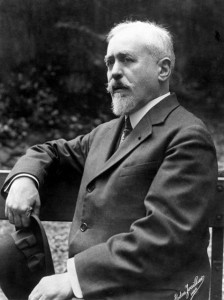
Every so often, one music critic or another will put together a list of composers generally regarded as one-hit wonders. These lists are usually heavy on opera: Ponchielli for La Gioconda or Leoncavallo for I Pagliacci. Among the non-operatic titles are Samuel Barber and his Adagio for Strings, and depending on the depth of the list (and the depth of the critic), there’s often a mention of Paul Dukas (below, right) for The Sorcerer’s Apprentice.
Who hasn’t heard The Sorcerer’s Apprentice or at least seen the Walt Disney treatment of it in the animated “Fantasia” (1940), with Mickey Mouse and all those brooms and buckets of water. But Dukas, whose La Péri will be performed by the Chicago Symphony Orchestra on March 6-8, is worth knowing beyond his one big hit. He was a fascinating man, close friends with Debussy and more than a nodding acquaintance of Saint-Saëns. Along with being a composer, he was a scholar and music critic, and in later life, a highly regarded teacher. Among his many students were Olivier Messiaen, Carlos Chávez and Joaquin Rodrigo.
Born in Paris in 1865, Dukas lost his mother, a pianist, five years later when she gave birth to the family’s third child. Though Dukas began piano lessons at a young age, he was hardly inspired. When he turned 14, however, he began composing, and by age 16, he was studying at the Paris Conservatory.
 He won several prizes there but was disappointed at not winning the Prix de Rome, the school’s highest award. He left the conservatory, served in the military for a few years and then embarked on twin careers: composer and music critic. His first published review was of a Ring cycle conducted by Gustav Mahler at Covent Garden! In 1892, he made his Paris debut as a composer with his overture Polyeucte, which received its premiere under Charles Lamoureux and his Orchestre Lamoureux. That same year, Dukas wrote The Sorcerer’s Apprentice. The 12-minute piece would overshadow all his other works.
He won several prizes there but was disappointed at not winning the Prix de Rome, the school’s highest award. He left the conservatory, served in the military for a few years and then embarked on twin careers: composer and music critic. His first published review was of a Ring cycle conducted by Gustav Mahler at Covent Garden! In 1892, he made his Paris debut as a composer with his overture Polyeucte, which received its premiere under Charles Lamoureux and his Orchestre Lamoureux. That same year, Dukas wrote The Sorcerer’s Apprentice. The 12-minute piece would overshadow all his other works.
Incredibly self-critical, Dukas destroyed many of his compositions simply because he was dissatisfied with them. His last published orchestral work was the one-act ballet La Péri (1912). It begins with a fanfare that is a stand-alone favorite among brass players and then goes on to tell the story of a young Persian prince who travels to the ends of the Earth seeking immortality. It is a harmonically lush work, full of exotic sounds and Debussian textures. It shows Dukas as a master of his craft, a composer who is at the absolute height of his creativity.
After La Péri, Dukas largely retreated to teaching and writing criticism. He died in Paris in 1935 at the age of 69. Had he lived for five more years, he would have basked in the popular success of Disney’s “Fantasia,” the animated classic that immortalized his Sorcerer’s Apprentice — and Dukas himself.
Chicago-based writer Jack Zimmerman has authored a couple of novels, countless newspaper columns and was the 2012 recipient of the Helen Coburn Meier and Tim Meier Arts Achievement Award. He currently works as subscriber relations manager for Lyric Opera of Chicago.
PHOTO: Paul Dukas is best known for The Sorcerer’s Apprentice, which Disney turned into a pop-culture touchstone with the film “Fantasia” (1940).